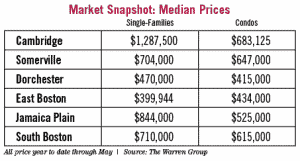Alot of cities across the world would kill for the influx of tech and biotech giants and startups that have made Greater Boston one of the most affluent places on the planet.
But in a trend that is happening in other wealthy tech cities across the country, giants and startups alike are increasing going urban as they target Cambridge and now downtown Boston and the fast growing Seaport/Innovation District.
And that is raising alarm bells with, of all people, economist Richard Florida. The urban development guru made a name for himself back in 2004 with “The Rise of the Creative Class,” arguing relatively open, university and research-rich cities like Boston and San Francisco were becoming magnets for new economy knowledge workers.
Now Florida is out with a new message, and it’s far from sunny for Boston, Cambridge and the inner suburbs, with their already sky-high condominium and home prices and rents.
In an aptly titled piece in the MIT Technology Review, “The Unaffordable Urban Paradise,” Florida contends that the tech explosion that helped lift cities like Boston and San Francisco up are now “tearing those cities apart.”
Florida notes that economists, mayors and urbanists believed that high-tech development was an unalloyed good thing, and that more high-tech startups and more venture capital investment would “lift all boats.”
But apparently it’s been too much of a good thing.
“The reality is that high-tech development has ushered in a new phase of what I call winner-take-all urbanism,” Florida writes. “A relatively small number of metro areas, and a small number of neighborhoods within them, capture most of the benefits.”
It’s not too hard to see how this dynamic has played out in the Bay Area.
Anger over San Francisco’s sky-high housing prices began to boil over in 2014, with Google and its highly-paid employees taking heat for making a bad situation even worse.
Placard carrying protestors targeted the shuttle buses the search giant uses to haul thousands of its employees who live in San Francisco to its suburban Mountain View campus.
The relentless expansion by Google and other tech giants in the Bay Area is now increasingly seen as a major force driving up home prices and driving out middle- and working-class families.
Bay Area tech giants now face pressure to build housing to offset new expansion plans, with Google proposing 2,500 new units to accompany a massive expansion planned for downtown San Jose.
The Next Frontier
 There aren’t any protestors blasting tech companies in Cambridge or downtown Boston for driving up condo prices and rents – at least not yet.
There aren’t any protestors blasting tech companies in Cambridge or downtown Boston for driving up condo prices and rents – at least not yet.
But the gangbuster expansion of tech companies in the Boston’s urban core area, not to mention our booming biotech sector, have certainly played a big role pushing already lofty prices in select areas of Boston, Cambridge and Somerville even higher.
With Cambridge seeing expansions by Microsoft, Google, Biogen and many others, prices in neighborhoods across the city and in neighboring Somerville kept on rising through the Great Recession and have been reaching increasingly lofty heights ever since.
The tech and biotech boom has long since spilled over into downtown Boston and the Seaport, with old banking offices in Financial District towers filling up with startups and with Vertex having long since made the jump from Kendall Square.
The impact on Boston’s housing market has been no less dramatic. South Boston and Jamaica Plain have both gone upscale fast, while once-gritty Fenway is becoming a hotspot for new luxury condo and apartment towers.
The writing is now on the wall for Dorchester and even East Boston, with major developers are now eyeing working-class neighborhoods as the next frontier in the steady gentrification of Boston.
That it is Richard Florida – Mr. Creative Class himself – who is warning of the hollowing out of working and middle class neighborhoods is certainly a bit rich. It was, after all, Florida’s snappy “Creative Class” theory and book that sent cities across the country scrambling to attract high-flying tech companies and their employees in the first place.
That said, Florida’s latest observations are right on target.
“In 1970, roughly two-thirds of Americans lived in middle-class neighborhoods; today less than 40 percent of us do,” he writes. “Places where the middle class is smallest include such superstar cities and tech hubs as New York, San Francisco, Boston, Los Angeles, Houston and Washington, D.C.”
Of course, Florida isn’t calling for some sort of Luddite counterrevolution where Boston and other cities start putting the kibosh on expansion by tech companies – his views may have matured but he hasn’t lost his mind.
But the University of Toronto economist’s proposal is nonetheless radical in its own way, especially in more buttoned-down Boston.
Florida calls for tech companies to take the lead in the push for more housing, including the lowering of zoning and other local rules that prevent market forces from meeting demand for new apartments, condos and homes. They also need to lead the charge in pushing for better public transportation and other key infrastructure, while also boosting the pay of their lower-skilled service workers, Florida contends.
Frankly, it’s hard to imagine Google executives battling it out with the Cambridge City Council over anti-housing zoning rules or Microsoft lobbying up on Beacon Hill for more money for the T.
But who knows, stranger things have happened, I guess.








